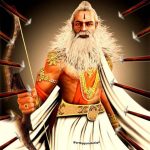Bhishma Pitamaha, a legendary figure from the Mahabharata, is often remembered for his unwavering loyalty and immense strength. However, his fall on the battlefield of Kurukshetra, riddled with arrows, presents a unique paradox.
A Loyal Warrior, A Moral Dilemma
Despite knowing the Pandavas were morally right, Bhishma fought for the Kauravas due to a lifelong vow. This internal conflict, a battle between loyalty and righteousness, made his final moments a poignant reflection of his complex character.
A Strategy or Divine Intervention?
Some believe Bhishma’s long-suffering on the battlefield was a strategic action. By delaying his death, he weakened the Kaurava army and ensured Pandavas’ victory. Others view it as a divine intervention, a chance for him to achieve salvation.
A Warrior Who Chose His Time
Bhishma wasn’t defeated because he lacked power or skill. In fact, he was invincible. He had a unique boon—the power to choose the time of his death. His fall happened only because he allowed it. This selfless act showed his understanding of duty; he knew his role in the war had to end to start what was right.
Lying on a bed of arrows, Bhishma chose to stay alive until the war ended. In his final moments, he shared wisdom about life, leadership, and dharma with Yudhishthira. This act of teaching, even in unbearable pain, showed his greatness—it wasn’t about how he lived but how he uplifted others, even in death.
Bhishma’s final days were marked by wisdom and guidance. He shared valuable insights with the surviving Pandavas and Kauravas, offering lessons on life, duty, and the consequences of war. His teachings continue to inspire generations, reminding us of the importance of righteousness and the impermanence of life.
Feature Image Credit: Pinterest.




